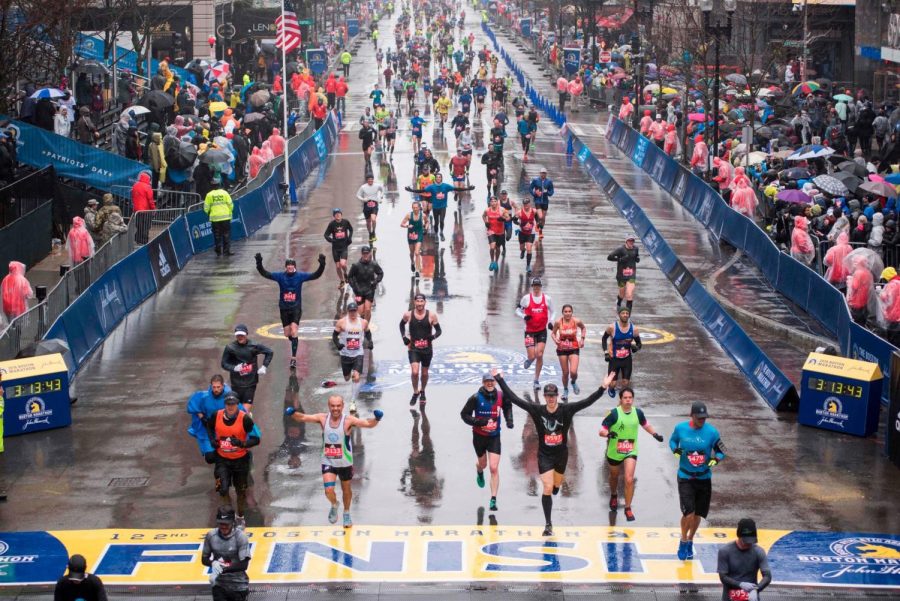The 127th Boston Marathon – For the History Books
April 25, 2023
Last week, on April 17, 2023, the Boston Marathon, America’s oldest annual, took place in the busy, rainy streets of the historic city. One of the six major marathons in the world, it featured over 30,000 runners representing over a hundred different countries. However, of the thousands of participants, there can only be one male winner and one female winner, and for this year, that turned out to be Evans Chebet for the men’s side with an outstanding time of 2:05:34—the sixth-fastest in the course history—and Hellen Obiri as his counterpart, who also clocked an impressive time of 2:21:38. The runners’ victories led to the third straight Kenyan sweep of the prestigious marathon, which was filled with so many unprecedented accomplishments this year.
Unfortunately, contrary to what many people expected, Eliud Kipchoge—the marathon world-record holder and two-time Olympic gold-medalist—didn’t win the race and instead finished sixth overall with his slowest time in his career of 2:09:23. It was his third defeat in 18 marathon races, and the only marathon in which he competed and still failed to cross the finish line in first place. A few possible reasons for his poor performance are that he developed an upper left leg issue in around mile 18, after two of the marathon’s infamously-challenging Newton hills, for which he had to drop from the lead pack in the race and limp after having finished it. Additionally, right after his leg pain started, Kipchoge missed a water-bottle station, which may have contributed to his slowing down in the following minutes. Four hours after he finished the race, the world-class runner posted on Instagram, saying “I live for the moments where I get to challenge the limits.” He later continued, “I pushed myself as hard as I could, but sometimes, we must accept that today wasn’t the day to push the barrier to a greater height.” Regardless of what happened this week, Kipchoge nevertheless aspires to become the first runner to reach three Olympic gold medals for the 26.2 mile race, as well as the first person to win all six major marathons. He has already won four of them—Berlin, London, Tokyo and Chicago—needing just two more wins: the Boston Marathon and the New York City Marathon (he has yet to compete in New York City).
For Evans Chebet, it was his third consecutive marathon victory in two years—he won both the Boston and New York City marathons last year—in which he became the first male runner to defend the Boston title since Robert Kipkoech Cheruiyot won it three times in a row from 2006-2008. On top of that, Chebet is the 25th Kenyan men’s champion and the fourth in a row. He, along with his training partner Benson Kipruto who finished third and Gabriel Geay of Tanzania, constituted the lead pack for the entire race, speeding up for the last three miles until Chebet sprinted away towards success. Geay crossed the line just ten seconds later, and Kipruto just two seconds after Geay. However, despite the rankings, the two Kenyan training partners are currently considered the world’s second- and third-fastest runners, after Kipchoge.
On the women’s side, it was only the second marathon for Hellen Obiri (she placed sixth for her November debut in New York City) to which she was added three weeks before the race as a wild card. Obiri wasn’t sure of competing in this one after having recently moved to the United States only three weeks ago, but her three-time U.S. Olympian coach, Dathan Ritzenhein, told her to go for it. For the duration of the race, the leading group stayed together until they reached the last mile when Obiri decided that the victory was hers for the taking. She sped away from her competitors into the roars of the fans on the final straight on Boylston Street. Nevertheless, stacked with some of the best runners in the world, the marathon’s final female rankings were extremely close, with merely a few seconds of difference between each time. Among these participants was American runner Emma Bates in the top five with the second-fastest time (2:22:10) in Boston in American history. In addition, she was the fastest U.S. runner in 2021, placing seventh at the Tokyo Olympic trials, and she’s expected to qualify for the three-women Olympic team next year in Orlando.
Adding on to her recent triumph, Obiri also has quite the running resume. She’s a two-time Olympic silver medalist for the 5000m race in which she currently holds the Kenyan national record, along with for the mile and 3000m. Additionally, less than a month ago, she established a new course record for the New York Half Marathon.
As for the celebrities in the race, the former captain of the Boston Bruins (ice hockey team) Zdeno Chara finished in 3:28:23. Celebrity chef Daniel Humm ran it in 2:58:53. Former Olympic tennis player Monica Rakitt, known as Monica Puig, finished in 3:49:47. Lastly, former football player and Heisman trophy winner Doug Flutie finished in 5:28:34. Ironically, Flutie, who wore No. 22 at Boston College and No. 2 in the NFL, had bib No. 222, and Chara, who wore No. 33 for the Bruins, had bib No. 3333.
All in all, the 127th Boston Marathon turned out to be one of the most competitive and groundbreaking in running history, shocking the fans around the world and setting new records for the future. The marathon’s notoriously-steep hills and challenging course is no match for the runners’ talent, and throughout history, the race has been a place for PRs to be shattered and upsets to occur.


















































































































































